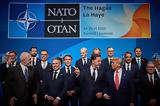Greek Voices Join Pan-European Movement Against NATO Military Spending Hike
In Greece, citizens, academics, trade unionists, local officials, activists, and young people, have united behind the STOP REARM EUROPE initiative, a growing movement calling for peace and an end to militarization.
Following the recent NATO Summit in
The initiative stands in stark opposition to what it sees as the dangerous shift toward a European war economy. Supporters argue that instead of investing in social welfare, green transition, and public services, European governments are choosing to follow a militaristic agenda, reminiscent of policies promoted during Donald Trump’s presidency. They view the Greek Prime Minister’s presence at the NATO summit as symbolic of this alignment, describing it as “predictably disappointing.”
Central to the movement’s message is the urgent call to stop the ongoing genocide in Gaza. The declaration accuses Israel of committing crimes against humanity with the complicity of the U.S. and the silence or support of most EU governments, including Greece. Campaigns like March to Gaza are held up as expressions of global solidarity and emerging peace consciousness.
The EU’s ReArm Europe plan—a massive €800 billion rearmament initiative—has drawn sharp criticism. Activists warn that such spending will inevitably come at the expense of education, healthcare, housing, and climate policy, while increasing public debt. They see this as submission to NATO demands and a direct threat to democracy and social cohesion.
Tensions in the Eastern Mediterranean further highlight the risks of escalating militarization. Despite shared NATO membership, Greece and Turkey continue to invest heavily in arms, driven by long-standing disputes over maritime zones and energy resources. Critics argue this arms race is both outdated and dangerous, especially as fossil fuels lose global relevance.
Greece, already leading NATO in defense spending at 3.1% of GDP, has announced a new €28 billion arms program. Simultaneously, Turkey is also benefitting from European defense funds—an irony not lost on critics who point to the futility of this competitive buildup.
The STOP REARM EUROPE movement sees war preparations as a threat not only to international peace but to the very foundations of European societies. It warns that we are sleepwalking into a new era of global conflict, where nationalism, militarism, and even fascism threaten to reclaim power.
#NATO- Δημοφιλέστερες Ειδήσεις Κατηγορίας Ειδήσεις
- Δημήτρης Μπενέκος :Με δική τους πρωτοβουλία, τα κορίτσια του χωριού συγκεντρώθηκαν και καθάρισαν τον τόπο τους
- "Παραλίγο να μην ξαναπερπατήσω εξαιτίας του" - Οι χειρότερες κριτικές σε γιατρούς
- Μυτιλήνη: Εξαφανίστηκε από το νοσοκομείο
- ΛΕΞ: Έγραψε Ιστορία στη συναυλία στο ΟΑΚΑ - Η Χάρις Αλεξίου εμφανίστηκε στη σκηνή - Δείτε βίντεο
- ΑΑΔΕ: Στη δημοσιότητα τα ονόματα όσων χρωστούν πάνω από 150.000€
- Μεγάλη φωτιά στη Ναύπακτο: Ήχησε το 112 για εκκένωση περιοχών – Μάχη των πυροσβεστών με τις φλόγες
- Απαγορευτικό απόπλου από Πειραιά, Λαύριο, Ραφήνα - Κανονικά τα δρομολόγια για Αργοσαρωνικό
- Χαμός στο ΟΑΚΑ με τον Λεξ – Η Χάρις Αλεξίου ανέβηκε στη σκηνή και αποθεώθηκε
- Προσωρινή διακοπή στο Μπενφίκα – Τσέλσι
- 60.000 ταπεινοί και πεινασμένοι φώναξαν «Που ‘σαι, ρε ΛΕΞ;»
- Δημοφιλέστερες Ειδήσεις Dikaiologitika

- Τελευταία Νέα Dikaiologitika
- Greek Voices Join Pan-European Movement Against NATO Military Spending Hike
- Μεγάλη φωτιά τώρα στη Ναύπακτο, μήνυμα από το 112
- Ο ΛΕΞ έβαλε «φωτιά» στο ΟΑΚΑ - Εικόνες και βίντεο από τη μεγάλη συναυλία
- ΥΠΕΞ προς Τουρκία: Η επίκληση του διεθνούς δικαίου προϋποθέτει να υιοθετείται
- Αυτές είναι οι καλύτερες ταινίες του 21ου αιώνα, σύμφωνα με ψηφοφορία των NYT
- Κολύμβηση: «Χρυσή» η Βασιλάκη στο Ευρωπαϊκό πρωτάθλημα U23 με πανελλήνιο ρεκόρ στα 1.500 μ. ελεύθερο
- Άνοιξε ο εναέριος χώρος του Ιράν, κλειστά τα αεροδρόμια της Τεχεράνης
- "Νέα ξεκινήματα": Η Xiaomi λανσάρει τα Xiaomi YU7, Xiaomi MIX Flip 2, Xiaomi Pad 7S Pro 12.5 και διάφορες συσκευές AIoT στο Πεκίνο
- Έκλεισε ο Λυκαβηττός, μέχρι νεοτέρας - Οι 10 περιοχές σε συναγερμό για φωτιά
- Σεισμός τώρα στην Κορώνη
- Τελευταία Νέα Κατηγορίας Ειδήσεις
- Στα 3 δισ. δολάρια οι ζημιές από τις ιρανικές επιθέσεις στο Ισραήλ: «Δεν έχουμε ξαναδεί τέτοιους αριθμούς όσον αφορά περιουσίες»
- ΗΠΑ: Σαρωτικό νομοσχέδιο του Τραμπ για τα δημοσιονομικά περνά με επιτυχία το πρώτο του εμπόδιο στη Γερουσία
- Θυελλώδεις βόρειοι άνεμοι μέχρι 9 μποφόρ προβλέπονται για σήμερα
- Μεγάλη φωτιά στην Παλαιοπαναγιά Ναυπάκτου – Καλύτερη η εικόνα στο μέτωπο (βίντεο)
- Φωτιά: Υψηλός κίνδυνος την Κυριακή – Ποιες περιοχές χρήζουν προσοχής
- Φωτιά στη Ναύπακτο: Καλύτερη η εικόνα του μετώπου - Δεν κινδυνεύει ο οικισμός
- ΗΠΑ: Με 51 ψήφους υπέρ και 49 κατά πέρασε από τη Γερουσία το «μεγαλο, όμορφο νομοσχέδιο» Τραμπ
- «Ήταν σαν “Το Παιχνίδι του Καλαμαριού”» – Παλαιστίνιος περιγράφει τον «Γολγοθά» στην προσπάθειά του να λάβει ανθρωπιστική βοήθεια
- Απαγορευτικό απόπλου λόγω θυελλωδών ανέμων – Κανονικά τα δρομολόγια για Αργοσαρωνικό με έγκριση πλοιάρχων
- Πότε θα είναι έτοιμη η νέα «παραλιακή» -Το χρονοδιάγραμμα για την υπογειοποίηση της Λεωφ. Ποσειδώνος



